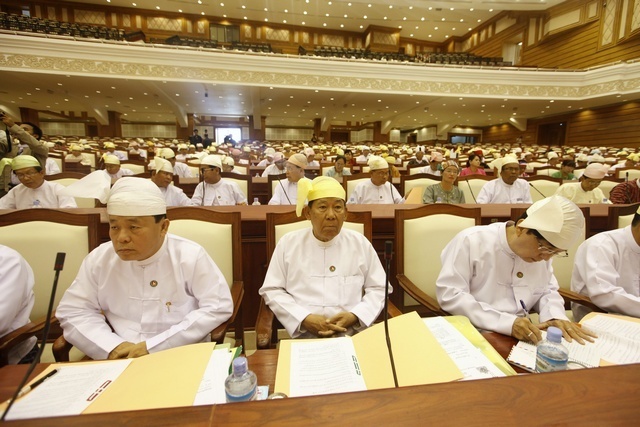Burma’s upper house of parliament voted on Tuesday to discuss switching to a proportional representation (PR) voting system. The issue is likely to take the floor within the next week during the current session of parliament.
The proposal, submitted to parliament by the National Democratic Force (NDF), seeks to reform Burma’s electoral system from a first-past-the-post system to a proportional system before general elections scheduled for 2015.
Proponents of a PR system argue that it would foster Burma’s nascent multi-party democracy and reduce wasted votes.
“It will be more suitable to use an electoral system that allows participation from multi-parties,” said Khin Waing Kyi, an upper house representative for the NDF. He added that the change could “facilitate more dynamic discussions” in parliament as the country seeks development for its diverse population.
Others have greeted the move with scepticism, claiming that it could be a veiled attempt to prevent a landslide victory for the main opposition party, the National League for Democracy (NLD).
“It is too early to introduce such a system to a semi-dictatorship like Burma,” said Soe Aung, a spokesperson for the Forum for Democracy in Burma (FDB), explaining that the system could allow for pro-military coalitions to gain seats and weaken the opposition’s representation in government.
“This move clearly shows that the regime is counting on its allies to stop a possible NLD landslide victory in 2015 general elections,” he said.
[related]
Parliament’s decision to open the issue for discussion has already caused controversy; NLD upper house representative Aung Kyi Nyunt has begun preparing a case against PR on the basis that though small ethnic parties have strong support bases, many of the most disadvantaged are spread out in areas with more dominant ethnic groups.
He further claimed that electoral reform, at this stage, could cause discord and distract politicians from core issues.
“I am personally concerned that changing the electoral system while trying to transform the country into a federal union can divert attention from the latter,” said Aung Kyi Nyunt. “We would not want that to happen.”
Electoral democracy in Burma still suffers from growing pains: In 2010, elections were held for the first time in 20 years. The polls were universally dismissed as illegitimate, and were boycotted by the NLD. In 2012, by-elections were held with some welcome improvements to protocol, and dealt 43 seats to NLD members.
While opposition parties have gained some representation over the past two years, recent regulation changes have been said to undermine them in the lead-up to general elections next year. The UEC is currently pushing for new limits on campaign periods and representative campaigning.
The commission has also been accused of “intimidating” Aung San Suu Kyi over comments she made about the Burmese military’s reluctance to allow constitutional reform. Human Rights Watch suggested on Thursday that the UEC, which was created by the former military regime just prior to the 2010 elections, is not a genuinely independent electoral body and needs further internal reform.



